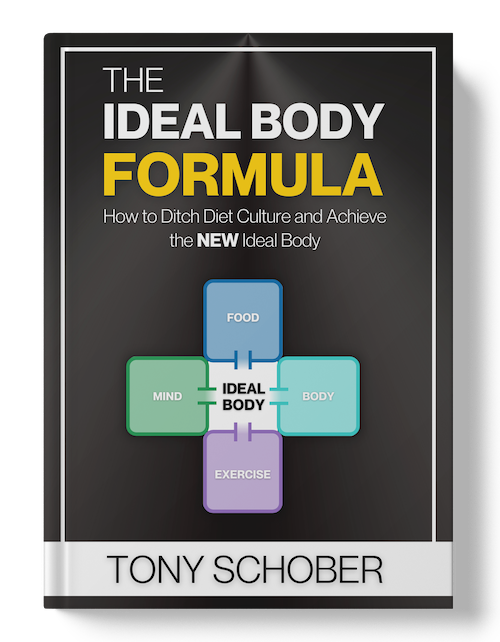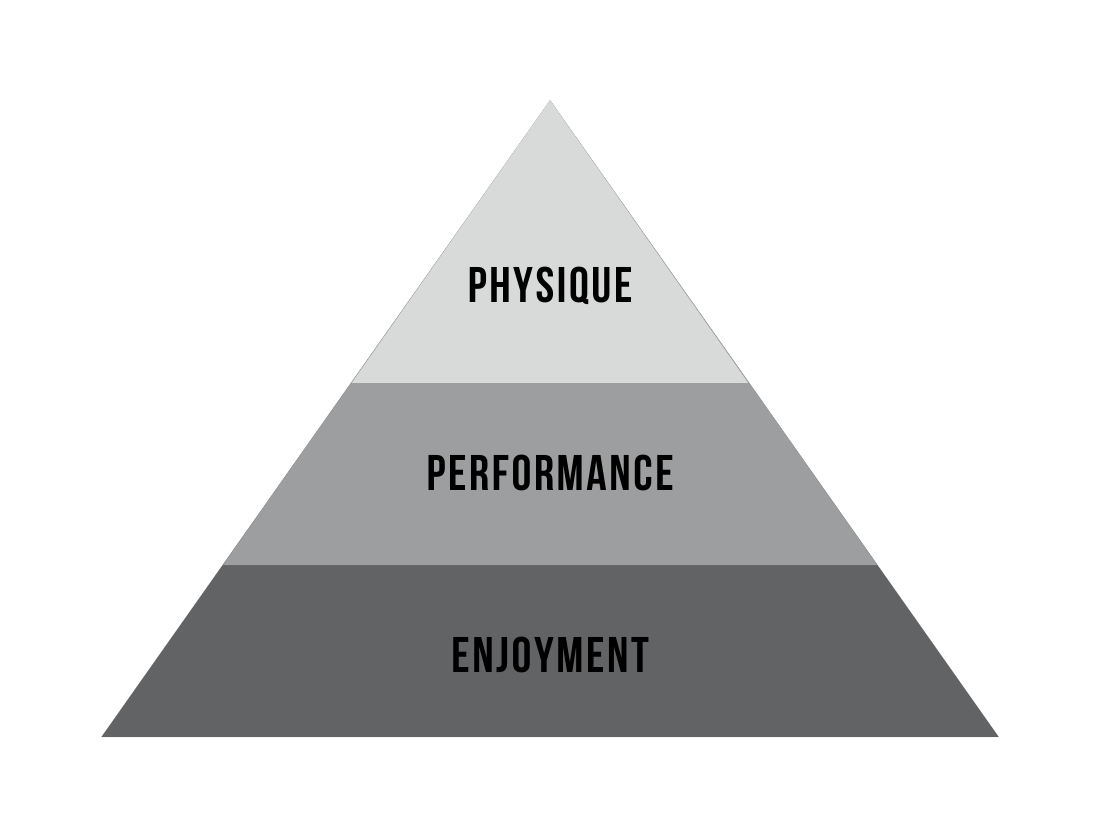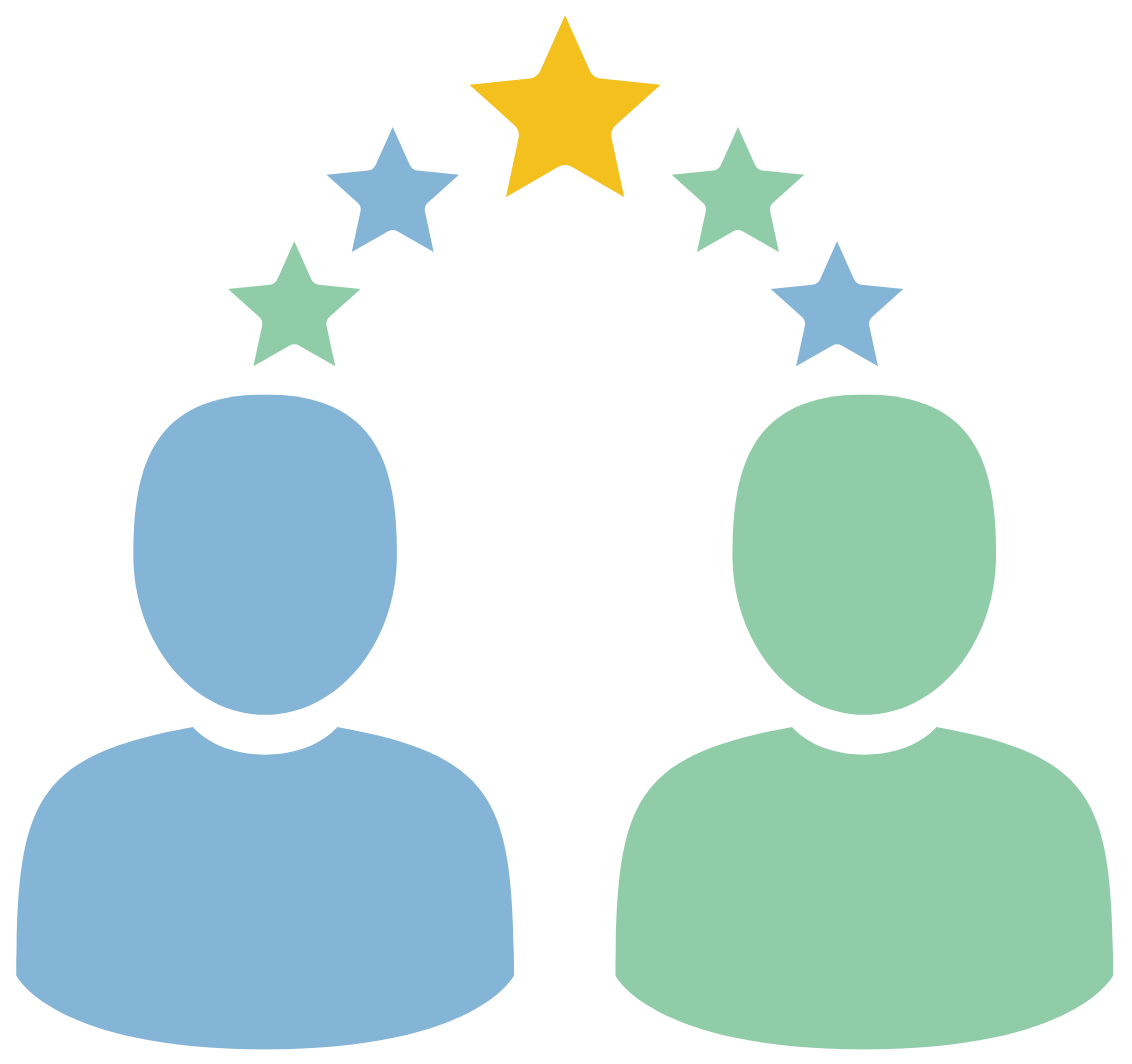Getting ZZZZZs
I always feel a little weird talking about sleep. It seems like a boring topic to me. When I tell people to make sure they sleep well, I feel like I’m that parent standing over their kid telling them to eat their veggies. Yet even though we all know we should be sleeping well, very few people actually are.
This is a big problem. Most people are focused on the 80% of the details that only get them 20% of their results. They focus on tips and tricks and all those little sexy strategies that get you excited to take action and do something different. Because surely your struggles couldn’t be something as simple as sleep issues.
That’s where most people are wrong. If I had to rank all the things I talk about in this book from least impactful to your Ideal Body journey to most impactful, sleep would be rated the highest. It is the single greatest fundamental influencer of your progress, yet is the single greatest neglected aspect of most people’s journey. Health basics aren’t sexy. But then again, neither are the side effects of not doing them.
Too many people are focused on micromanaging carbs, calories, or protein, when they aren’t even getting a consistent 8 hours of sleep each night. That’s putting the cart before the horse. It’s trying to put the icing on a cake before you’ve even baked it.
Lack of optimal sleep handicaps your efforts. Everything you do ends up feeling like you have a ball and chain tied to your ankle. Does it prevent you from taking action? In most cases it probably doesn’t. But it does make everything harder – adding unnecessary resistance to implementing optimum thoughts and behaviors.
Sleep is a prime period of recovery for us. It puts us into the necessary state to recover both physically and mentally. It rebuilds muscles and other tissues. It tops up willpower stores for the day ahead. And it keeps beneficial stress from becoming chronic.
Lack of sleep influences your eating choices. When you’re sleep deprived you are more likely to reach for convenience foods that are more calorically dense. You tend to snack more. You have a harder time finding the energy, and thus the motivation to exercise. You prevent your willpower from being fully refreshed, which means you’re running closer to empty all throughout your day. You become less emotionally resilient, which influences your ability to cope with emotional discomfort, which leads to things like emotional eating, decision fatigue, and a general sense of just wanting to go back to your old ways that require less mental and physical demands.
And here’s the thing – when I’m talking about lack of sleep or being sleep deprived, I’m not just talking about the quantity of your sleep each night. I’m talking about the quality of that sleep too. Because anything less than optimal adds unwanted resistance. You’d be surprised just how much easier your health and fitness journey becomes, let alone your life, when you prioritize the rejuvenation and recovery aspects of sleep.
So how much do you need? Well, studies show anywhere from 7-9 hours per night is optimal. Both less and more than that tend to be correlated to negative side effects. However, these numbers are very individual. Just because you’re in that range it doesn’t mean that’s what’s optimal for you.
So how do you tell how much sleep you really need? I like to use the alarm clock test. If you’re waking up to an alarm, it’s unlikely you’re getting enough sleep. That should be obvious. You are interrupting a sleep cycle and jarring yourself awake. Anyone who has ever woken up naturally knows how much better and fresher they feel as a result.
I personally need about 8.25h of sleep each night. So I’m shutting things down the night before to give me enough time to be asleep by 9:45pm since I wake up at 6am. When I get to bed on time, I tend to wake up naturally sometime before my alarm – anywhere from 5-20 minutes before it. And when that happens, I just get up. I don’t need to go back to bed, because I feel fully refreshed and ready to tackle my day.
This is the true definition of sleeping in. Sleeping in is less about the time you wake up, and more about how you feel when you do wake up. And this is influenced by how consistent your sleep schedule is and how long you sleep.
Sure… there’s the odd day here or there where I get to bed later than that and I have to wake up to a jarring alarm with less than optimal sleep, but that is the exception to the norm. Most people have that backwards and are getting less than optimal sleep 90% of the time with maybe a day or two on the weekend when they sleep in.
The sleeping in that’s currently happening on the weekends, by the way, likely isn’t an accurate representation of the real sleep you need. It tends to be exaggerated due to the sleep debt that accumulates throughout the week. As you start to establish a consistent sleep schedule, going to bed and waking at similar times each day, you’ll get a much better idea of how much sleep you really need.
It’s time to start bringing that refreshed feeling of sleeping in to every single one of your days. The most productive days start, not when you wake up, but when you go to bed the night before. So make sure you are getting off on the right foot. Achieving your goals is so much easier when you aren’t fighting against the wind.
Managing Stress
Stress is not a bad thing. In fact, stress is a very good thing to experience. It’s the very thing that allows us to grow both physically and mentally/emotionally. Stress only becomes a problem when you don’t allow yourself to recover from it, which then leaves stress unchecked and in a chronic state.
There are both physical and mental stressors. And each can be created intentionally and unintentionally.
For example, we’ve all experienced stress from work or life. This is what you’d call unintentional mental stress. It is the result of you being in situations that create emotional discomfort. You can call it adversity, but most would just call it exhaustion, frustration, annoyance, or anger at your life situation. Regardless, if you allow yourself to recover from these stressors, you become more emotionally resilient to the same stressors over time. When you don’t allow yourself to recover from it, it becomes chronic stress, and that can lead to all kinds of consequences – health issues, negative life experience, the people around you getting the residual side effects of your stress, low energy, and so forth.
But this mental stress can also be intentional. This is what a lot of personal development is, and something you’ll be experiencing a lot as you heal your relationships with food, body, exercise, and mind. Intentional mental stress is better known as pushing your comfort zone. You intentionally put yourself into situations that create emotional discomfort in an effort to grow as a person. Maybe you hate public speaking but you do it anyways. Or maybe you have a difficult conversation with a co-worker, family member, or friend over boundaries. Whatever the situation, by pushing your comfort zone, it expands. And after some short-term discomfort, your life as a whole becomes easier and more fulfilling.
Physical stress can also be experienced both intentionally and unintentionally. Intentional physical stress is better known as exercise. That’s right, exercise stresses the body. It’s the stimulus that forces your body to adapt. Every time you run your body adapts and gets faster. Every time you lift weights your body adapts and gets stronger.
But if you leave this intentional physical stress unchecked, it can become chronic, also known as overtraining, or more accurately known as under-recovering. When this stress is chronic you experience issues like injuries, illness, and motivation struggles.
Unintentional physical stress is simply the movement you experience as part of your life. Maybe you have a demanding job. Or maybe you do a lot of physical work around your home. Whatever the case, periods of recovery are required to balance the stress cycle and keep it from becoming chronic.
How do you do that? Some of it you already do. When it comes to unintentional mental stress you take vacations and have weekends to recover. Intentional mental stress that is of the personal development nature tends to come in cycles of pushing out of your comfort zone for a while and then recovering within that new expanded zone until you’re ready for a new push. Intentional physical stress is recovered from using days off from training during the week, extended occasional deloads, and by managing the amount of fatigue you accumulate on a workout to workout basis. And unintentional physical stress tends to also be recovered from in the form of weekends, vacations, and evenings/nights out.
So hopefully you see now that stress isn’t a bad thing. Avoiding stress isn’t going to help you. All that does is shrink your comfort zone, make your life feel smaller, and forces your body to become weaker and less able to handle the functional needs of life. It’s the flip side of stress, aka recovery, that balances this stress cycle and allows you to grow as a person. So don’t avoid it. Embrace it. And then balance it with the necessary recovery if you want to thrive.
Resting Is Doing Something
There are two kinds of people in this world. People who have a hard time exercising when they’re not motivated. And people who have a hard time not exercising when they are. But really, we all tend to experience both of these scenarios at various times.
I’ve come to realize that getting people to take some time off from working out when they’re extremely motivated to exercise is a difficult thing to do. These people have a lot of limiting beliefs surrounding exercise that prevent them from prioritizing rest and recovery.
I was one of those people. I’m the guy who gets super motivated to try a new strength training program, or to take up running and do too much too fast, only to start feeling some aches and pains creep in. Of course I ignore them, because I need to keep working out so that I don’t lose all my progress.
These overuse injuries get worse and worse until eventually I’m forced to take time off. But at this point I have to take a much longer absence from exercise in order to heal my body than if I would’ve just listened to my body and better prioritized rest and recovery.
Not all motivation is good. It’s only good motivation if it provides you with a positive outcome. If your motivation drives you into the ground and destroys your body, steals the energy of your day, or keeps you living in fear of losing your results, then that is not good motivation – it is a liability.
I hear all kinds of reasons for not wanting to take enough days off from exercise or not wanting to rest enough in general. But one of the biggest objections is people say they feel like when they don’t work out that they aren’t doing anything.
Here is what I always say – resting IS doing something. In fact, it’s a very difficult something to do for a lot of people.
Your body doesn’t grow when you exercise. It grows when you rest and recover. Exercise is only a stimulus for growth. It is not growth itself. That workout you just did? You didn’t grow from it. In fact, your body is now broken down and in a weaker state than when you started.
Exercise doesn’t build muscle. It breaks it down. It doesn’t make you stronger. It actually makes you weaker initially. Nor does it make you faster or give you more endurance. These are all just stimuli for growth. For the growth cycle to complete, it has to be paired with recovery.
We stimulate growth, accumulate fatigue, and then recovery and grow. That’s the process. If any of those areas are lacking, the growth cycle will suffer. You will get negative side effects such as injuries, illnesses, and stagnant progress. And when any of these things happen, your motivation suffers and potentially causes a chain reaction downstream.
Your routine breaks down and you become inconsistent. Your eating falls off track, and you stop feeling your best. One thing leads to another and you end up going through a period of stagnation or even regression in your personal development journey.
Only you can determine if you’re getting enough rest. You don’t have to do nothing. Sometimes reduced volume or intensity is enough depending on your overall fitness level. But if your motivation is rooted in fear, there’s a good chance your recovery is suboptimal and you could stand to benefit from more of it.
Remember, operating at high levels of fatigue from unchecked stimulation and stress can negatively affect hormones, mood, thoughts, and behaviors. There are a lot of people who are actually imprisoned by exercise and their lives reflect that.
Exercise is good for you and you should find joy in moving your body. But it needs to be paired with recovery for you to have the best experience with it.
Recovery is what builds you back up better, stronger, and faster. Without it, you simply experience the negative side effects of unchecked stress. Every day you intentionally stress your body without allowing it to build itself back up and become more resilient to it.
So don’t think for a moment that you’re lazy or that you aren’t doing anything when you’re taking days off from working out. Rest and recovery add to your life experience and make you a stronger person in the end.
Get On the Priority List
Sometimes managing fatigue and optimizing recovery means doing nothing and resting, but other times you are able to recharge yourself by engaging in an activity that creates a flow state. For this reason, it’s important that you set aside time every single day that is just for you to do anything that you want.
This me-time is free of most if not all responsibility to others, and is used as a form of self-care. You use it to meet the universal basic need of autonomy and being able to express yourself as a human being. When you do this, you recharge your body and mind, top up willpower stores, and put yourself in a better position to handle the stressors of life.
This me-time is already built into our society. It takes the form of weekends and vacations. These are periods of time that we as a collective have deemed as necessary to charge our batteries and keep our quality of life high. However, in our fast paced society, along with financial issues for some people, these recharge times end up getting squeezed to the point where they feel non-existent.
While many people might get weekends off from their job, many times their responsibilities as a parent are just beginning. Sports, activities, and other obligations can easily eat away at your me-time. This can cause all sorts of unwanted side effects, from emotional eating to depression.
For a lot of people, they put everyone else first at the expense of themselves. When things get busy, the first thing/person to get cut is themselves.
That needs to change. Part of this healing process is learning how to get yourself back on the priority list. We could argue all day about whether you should be priority number one (you should be, by the way), but regardless, you should at least be ON the priority list.
Taking care of yourself and your needs means you are better able to not just handle life, but to thrive in it. That means you are at your best for others and for yourself. No one suffers when you are taking care of yourself.
I recommend that you have this me-time every single day. For some people this might seem like an impossible task. It might require you to have a discussion with your partner and work together as a team.
Deanna and I make sure we have our own time each and every day to do whatever it is we want. We also split up the weekends to ensure that we each have a day free of responsibilities and can just be a human being for once. Saturdays are her days and I take care of the kids. And Sundays are my days when she takes care of them. Although I can’t say that without also saying that there are plenty of Saturdays when she helps me out. Point being, communication is key, but we know that these days are available to us and can look forward to them to recharge.
While you don’t have to do what we do, you absolutely should be finding time for you, and often. When you don’t, negative side effects occur. You start feeling like a shell of a person. Recovery is impacted. And you’re not managing your fatigue optimally. If you’re not careful, this can create a downward spiral or keep you stuck in a state of stasis where very little personal growth and progress happens.
So get yourself on the priority list. Communicate with whoever you need to in order to get any help you need. Whether you work a 9-5 or are a stay at home mom/dad, you still deserve to have your basic human needs met. And it will only improve the lives of everyone around you.



